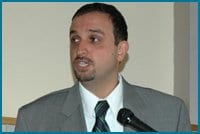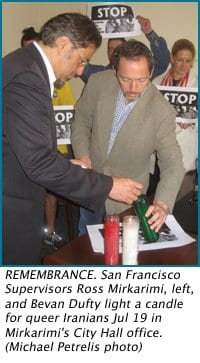
UNACCEPTABLE. Hossein Alizadeh, the communications director of the International Gay And Lesbian Human Rights Commission, says Iran continues to target individuals under its sodomy law. Credit: (IGLHRC photo)
The International Gay And Lesbian Human Rights Commission on Jul 18 condemned Iran for its continuing executions of teens and men accused of engaging in sodomy. In many, but not all, of the instances that have been publicized, the individuals have been accused of other crimes as well, such as rape.
IGLHRC communications director Hossein Alizadeh, a gay Iranian who won asylum in the U.S. based on his sexual orientation, cited recent cases of sodomy-related executions in the cities of Mashhad, Gorgan and Kermanshah.
“Despite a widely publicized outcry two years ago when Iranian authorities executed two young men in the northeastern city of Mashhed, the government continues to target, arrest, prosecute, and execute individuals under its sodomy law,” IGLHRC said. “IGLHRC … condemns Iran’s violations of human rights law and asks that human rights groups around the world work to support those targetted by the government.
“The Iranian media regularly publishes stories about the execution of alleged criminals on sodomy-related crimes,” the statement continued. “Just a week ago the spokesperson for the Iranian Judiciary announced that in the next few days some 20 criminals will be hanged in Tehran on a variety of charges, including sodomy.
“The International Gay And Lesbian Human Rights Commission condemns the prosecution and execution of individuals for consensual sex, including sodomy.”
The 20 announced executions also were the subject of a Jul 11 New York Times article, which said some of them were punishment for “homosexuality.”
IGLHRC executive director Paula Ettelbrick said execution amounts to “cruel, inhuman, and degrading treatment under international law, particularly in the context of consensual sexual conduct.”
“The added problem in these cases is that Iran seems to be arbitrarily targeting individuals perceived to be gay for these forms of heinous abuse,” she said. “The systematic use of torture, forced confessions, and the inhumane treatment of detainees discredits Iran’s criminal and judicial systems.”
IGLHRC noted that Iran refuses to allow independent investigation of its human-rights situation, which “makes it impossible for IGLHRC and other human rights organizations to verify many of the charges against alleged perpetrator[s] and to monitor their access to fair trials.”
The organization called upon human-rights defenders to support the work of the Toronto-based Iranian Queer Organization (irqo.net), to lobby their own governments to oppose Iran’s treatment of real or perceived GLBT people, and to request that their “government’s immigration service adopt policies to provide refuge to individuals who fear persecution based on sexual orientation or gender identity.”
HRW struggles to gather facts
Meanwhile, Human Rights Watch continues to question whether Iran is routinely executing men solely for consensual same-sex relations, noting that, with one exception, the cases that have been publicized seemingly
also involved other charges.
In postings to the Euro-Queer e-mail list on the topic of the most recently announced sodomy executions, HRW researcher Jessica Stern said that “reports from diverse media sources indicate” that the men to be executed for sodomy “have been convicted of rape, not homosexuality.”
Asked to name those sources, Stern, in a telephone interview and via e-mail, cited “BBC Persian, ISNA, IRNA [and the] Fars News Agency.”
“It is not in the best interest of LGBT Iranians for the international community to claim as a ‘gay case’ one that could in fact be about the rape of juvenile boys and girls,” Stern said on Euro-Queer.
HRW has responded similarly to some other reports that Iran allegedly has executed teens and men for engaging in consensual “lavat,” which HRW translates as “sodomy” and defines as “penetrative and non-penetrative sexual acts between men.”
The problem, Stern said, is: “There is no inherent meaning of consensual or non-consensual sex in this word [lavat]. Thus, it can be applied in criminal cases of consensual sex between men … and it can be applied in cases of non-consensual sex between men, as may be the case here” in this latest case.
In the latest case, a Farsi-speaking New York Times reporter said some people were to be executed for “homosexuality.”
But Stern said several native Farsi-speaking sources told her that the Farsi syntax of the charges presented to reporters Jul 10 by an Iranian judiciary spokesman was such that the word “lavat” (sodomy) — which appeared at the end of a spoken list of various charges faced by a group of 20 people — was modified by the word “rape,” which appeared at the beginning of the list, creating, in the minds of her sources, the phrase rape-sodomy.
However, Stern, who has been responsible for much of HRW’s research on Iran’s sodomy executions, said in a telephone interview that she is aware of at least one case where Iran apparently did execute adult males for consensual lavat.
“There was a case in 2005 … that basically two men were executed seemingly for consensual sex, lavat, when one of the men’s wives discovered a videotape of them having sex — so that was the one case I’m aware of that sort of seemed to break the mold,” she said. “The wife found the videotape, she watched it, she was horrified, she turned it in to the police.”
Meanwhile, on Jul 19, the second anniversary of the widely publicized hangings in Mashhad, gay activists gathered in Moscow, Cologne and San Francisco — and reportedly in Warsaw — to remember the hangings. GayRussia.Ru said about 25 people picketed Iran’s Moscow embassy.
In San Francisco, activists and city Supervisors Ross Mirkarimi and Bevan Dufty lit candles in Mirkarimi’s City Hall office.
Mirkarimi, an Iranian American, told the Bay Area Reporter, a San Francisco gay newspaper, that it is important not to underplay the issue of Iran’s sodomy executions.
“It’s important to be strategic … but we can’t tiptoe around something that is a blatant horrific action such as this,” he said.
Blogger and longtime activist Michael Petrelis, who organized the San Francisco vigil, told the BAR, “If this were 1941 Germany … I would not be silent, as a homosexual Jewish American.”
In the end, given information currently available, there is no disagreement among human-rights activists that Iran executes men convicted of sodomy. But in many of the cases that are publicized, the executed individuals apparently have been convicted of additional crimes, too.
Some of the activists working on the issue at various human-rights groups have said they personally believe that executions solely for consensual sodomy between adults are taking place in Iran regularly but that such cases usually are not publicized because such executions could cause public outrage both inside Iran and elsewhere.
In a “reflection” circulated Jul 20 by IGLHRC, the organization publicly acknowledged its “suspicions that [Iran’s] current practice really is to rid society of lesbians and gay men.”

 Why you can trust Xtra
Why you can trust Xtra


